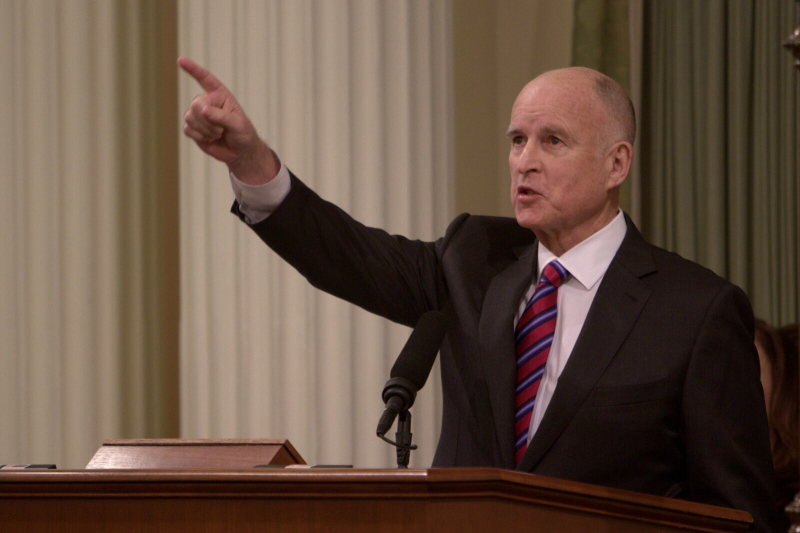Most notable was the governor's upping of the ante on California's already ambitious efforts to combat or mitigate climate change: a larger percentage of renewable energy on the state’s power grid, new goals for clean-burning vehicles and energy-efficient buildings.
"This is exciting, it is bold and it is absolutely necessary," Brown told the assembled audience of legislators and our live statewide radio audience.
It's an issue on which some of those close to the 76-year-old Democrat think the governor can channel the remnants of his youthful hunger for the White House.
"He really sees California as a nation-state," said journalist Orville Schell, who has remained close to the governor since penning a 1978 biography. "The national stage has gotten so corrupted, he's less interested in playing there."
Time and again in recent years, Brown has lamented the slow pace of action in Washington, D.C. From climate change to immigration, he's joined a chorus of those who think California can get on with the big issues even when others won't.
"Befitting a state of dreamers, builders and immigrants," he said in his address, "we have not hesitated to attempt what our detractors have called impossible or foolish."
But Brown also seemed to use the event to send messages -- some explicit, some only hinted at -- to others in state government about what he's not prepared to do.
Brown referred to the importance of health and human services, but he framed the issue -- as he's done in previous comments -- around California’s embrace of the federal Affordable Care Act. He did not, as some legislative Democrats want, discuss boosting state benefits for those who receive in-home care, the disabled, or broader changes (and expansion) of welfare-to-work assistance.
"He's extremely prudent," said Cassandra Pye, a Sacramento-based government affairs consultant who was deputy chief of staff to Gov. Arnold Schwarzenegger.
And yet, the governor's challenge is to correctly predict how long in this final term in office he can maintain his political leverage ... and avoid the onset of the "lame-duck" effect.
"Leaving some vagueness around health and human services [funding]," said Pye, "might be that leverage point."
Brown's most forceful rebuke in his inaugural address seemed to be directed toward the leadership of the University of California and Cal State University systems. The recent debate over potential tuition hikes has been especially heated with UC officials, including the system's president, Janet Napolitano.
"I will not make the students of California the default financiers of our colleges and universities," said the governor to bipartisan applause in the Assembly chamber. "To meet our goals, everyone has to do their part."
The governor's call for new efforts on funding infrastructure -- roads and bridges -- was embraced by transportation groups. And Brown's suggestion of renewed discussion about the causes of crimes seemed rooted in his unique blend of faith and frugality.
"All these changes attempt to find less expensive, more compassionate and more effective ways to deal with crime," Brown said.
And then, this instant classic: "Since time immemorial, humankind has known covetousness, envy and violence."
The long view of events, of history, of government was the real message in Brown's kickoff of this final term -- one, thanks to term limits that were enacted after he first served -- no one will ever have again in California history.
How he blends that long view with the immediacy of today's politics ... that may be the legacy on which observers will muse in the years to come.
